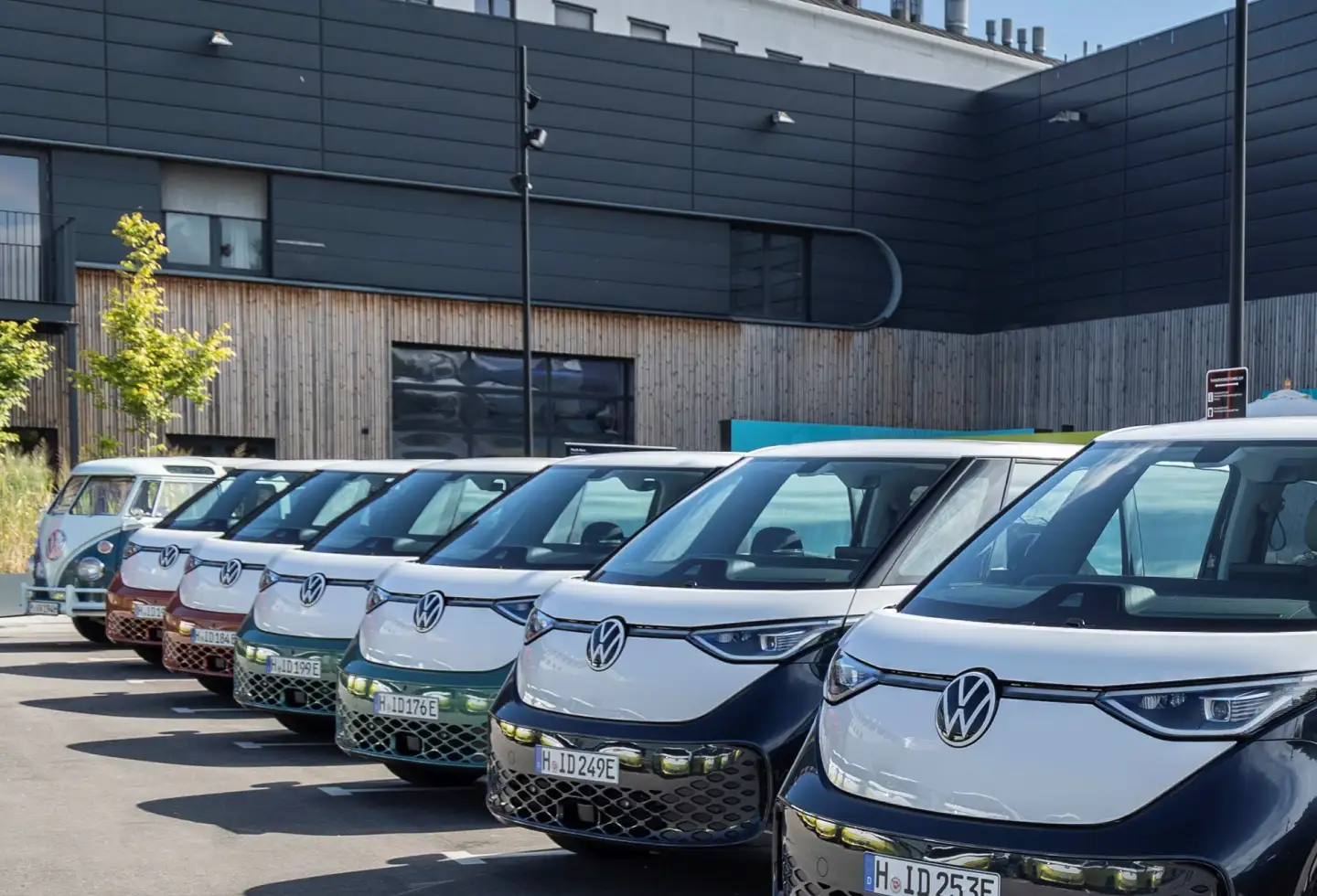For Volkswagen, the road ahead was looking increasingly rocky. As one of the world’s largest automakers, they were major contributors to greenhouse gas emissions and environmental degradation.
With climate change becoming an existential threat and regulations tightening, their traditional business model was on a collision course with a sustainable future.
Younger, environmentally-conscious consumers were shunning gas guzzlers, and investors were demanding bolder action on sustainability.
Volkswagen faced an uncomfortable truth – evolve or become obsolete. Reinventing their entire approach would require an audacious transformation, unlike anything in their 85-year history.
The Company
Founded in 1937, Volkswagen Group is a German multinational automotive corporation headquartered in Wolfsburg.
With a staggering $282 billion in revenue and over 670,000 employees globally, it is the largest carmaker in Europe and one of the largest companies in the world.
Volkswagen owns a portfolio of 12 automotive brands including Audi, Porsche, SEAT, Škoda, Bentley, Bugatti, Lamborghini, and its namesake VW brand.
For decades, Volkswagen epitomized Deutschland’s manufacturing prowess, macho car culture, and emission-belching air-cooled engines.
However, the 2015 “Dieselgate” scandal revealed illegal software designed to cheat emissions tests, costing the company over $30 billion in fines and penalties.
This crippling controversy severely damaged VW’s reputation and credibility, especially around environmental issues. Regaining public trust while pivoting to sustainable mobility would require an unprecedented transformation effort.
Defining the Core Issue
Volkswagen’s core business of internal combustion engine (ICE) vehicles producing greenhouse gases was unsustainable and misaligned with the future of transportation.
The company emitted 195.9 million tons of CO2 in 2022 alone. While gradual efficiency improvements reduced emissions slightly,
VW needed much deeper decarbonization to meet global climate commitments like the Paris Agreement.
Cities were banning ICE vehicles outright, consumer preferences were rapidly shifting to electric vehicles, and regulatory pressures were intensifying around emissions and ethical supply chains.
Volkswagen simply couldn’t kick the can down the road any longer. They risked being left behind by disruptive new entrants and stricter environmental standards that would make their core products obsolete.
Legacy practices like poor energy management, resource-intensive manufacturing, and component sourcing from polluting suppliers undermined sustainability.
Internal cultural barriers like short-term mindsets and silos prevented holistic climate action. And the aftershocks from Dieselgate severely damaged VW’s environmental credibility – a fatal vulnerability as eco-consciousness became a top purchase driver.
If Volkswagen didn’t pivot swiftly to sustainable mobility and operations, they jeopardized their very existence in a zero-emission future. A bold new sustainability vision was imperative.
The Pivot
In 2021, Volkswagen unveiled its “regenerate+” strategy – an ambitious pivot to become a truly sustainable, climate-neutral mobility provider with a net positive impact on the environment and society.

This holistic transformation touches every facet of VW’s $282 billion business across four dimensions:
Nature
- $100+ billion investment in electric vehicles with the goal of 70 new EV models by 2030
- Partnering with renewable energy providers to power manufacturing with clean electricity
- Transitioning to certified sustainable materials and closed-loop recycling of batteries
- Establishing gigafactories for local EV battery production to reduce transportation impacts
- Deploying carbon capture and emissions trading technologies at plants
People
- Reskilling and upskilling 600,000+ employees for e-mobility and sustainable practices
- Implementing diversity, equity, and inclusion initiatives to foster an ethical workforce
- Improving labor conditions and worker rights monitoring across the supply chain
Society
- Partnering with cities worldwide to develop people-centric urban mobility solutions
- Expanding charging infrastructure accessibility and investment in disadvantaged communities
- Launch of lower-cost small EV models to enable sustainable mobility for all income brackets
Business
- Spinning off software, battery, charging and mobility services into independent companies
- Investing €5 billion through 2025 to become a data-driven mobility services provider
- Focusing on circular economy business models like vehicle-on-demand and subscription services
- Deploying AI, robotics, and digital twin simulations to optimize manufacturing efficiency
This sweeping transformation involved restructuring operations, overhauling processes, launching new products/services, forging strategic partnerships, and culture change initiatives.
Critically, Volkswagen set measurable targets validated by the Science Based Targets initiative (SBTi) to hold themselves accountable.
The Outcomes of Volkswagen Sustainability
While still in the early stages, Volkswagen’s regenerate+ strategy is already yielding powerful results and industry recognition:
- Nearly 40% of vehicles sold in 2022 were battery-electric (over 500,000 EVs delivered)
- On track to have BEV manufacturing capacity of 3+ million units per year by 2025
- 80% of gigafactory electricity demands are met by renewable sources
- 30% of aluminum needs covered via closed material loops
- 63,000 employee training sessions on sustainability intelligence
- Development of compact EV models like the ID.3 and ID. Buzz priced for the masses
- Won the 2022 World Mobility Leadership Award for sustainable solutions
The true measure of this pivot’s success? Volkswagen reduced its carbon footprint by 7.9% in 2022, while boosting revenue by over €250 billion.
By finally aligning its business with a sustainable future of mobility, VW is now positioned to thrive for decades to come.
Key Learnings of Volkswagen Sustainability
Volkswagen’s bold regenerate+ transformation underscores that comprehensive sustainability demands rethinking every aspect of your business model and operations. Incremental changes are insufficient – disrupting your own legacy business is crucial before others disrupt it first.
Volkswagen’s holistic approach spanning electric products, renewable operations, equitable workforce practices and circular services showcases sustainability as an enterprise-wide opportunity, not a set of siloed initiatives.
Critically, setting binding public targets for emissions reductions, ethical supply chains and other impact areas holds companies accountable.
Ultimately, Volkswagen realized ignoring the sustainability imperative risked being disrupted out of existence. Their regenerate+ pivot represents sustainability leadership in action.





